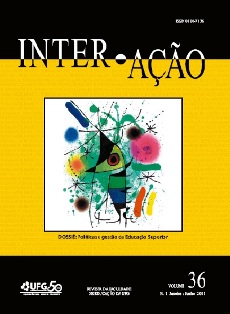FORMAÇÃO DE PROFESSORES DO CAMPO E TECNOLOGIAS DIGITAIS: ARTICULAÇÕES QUE APONTAM PARA OUTRAS DINÂMICAS PEDAGÓGICAS E POTENCIALIZAM TRANSFORMAÇÕES DA REALIDADE
DOI:
https://doi.org/10.5216/ia.v36i1.15041Resumo
o contexto da educacao do campo, marcado por precariedades no acesso as tecnologias, nos leva a pensar uma formacao de professores que permita a apropriacao dos processos, linguagens, conceitos e logicas proprias das tecnologias digitais, como forma de potencializar o protagonismo dos professores. Visando compreender as demandas do campo e provocar transformacoes no contexto, foram desencadeadas acoes de pesquisa e ensino na Licenciatura em Educacao do Campo da UFBA, cuja analise, pautada nos registros da pesquisa e nas falas dos cursistas, e objeto deste artigo. Percebe-se que os cursistas, experimentando e experienciando outras formas de se comunicar, aprender, produzir conhecimento e cultura, tem superado dificuldades e estranhamentos, passando a atuar como co-autores de conhecimentos e acoes. Contudo, existem aspectos da pratica pedagogica e da proposta curricular que devem ser revistos para possibilitar uma maior articulacao das tecnologias com a formacao dos professores.Downloads
Downloads
Publicado
Como Citar
Edição
Seção
Licença
A Inter-Ação utiliza como base para transferência de direitos a licença Creative Commons Attribution 4.0 para periódicos de acesso aberto (Open Archives Iniciative - OAI). Por acesso aberto entende-se a disponibilização gratuita na Internet, para que os usuários possam ler, baixar, copiar, distribuir, imprimir, pesquisar ou referenciar o texto integral dos documentos, processá-los para indexação, utilizá-los como dados de entrada de programas para softwares, ou usá-los para qualquer outro propósito legal, sem barreira financeira, legal ou técnica.
Autores que publicam neste periódico concordam com os seguintes termos:
1) Autores mantém os direitos autorais e concedem à revista o direito de primeira publicação, com o trabalho simultaneamente licenciado sob a Licença Creative Commons Attribution que permite o compartilhamento do trabalho com reconhecimento da autoria e publicação inicial nesta revista.
2) Autores têm autorização para assumir contratos adicionais separadamente, para distribuição não-exclusiva da versão do trabalho publicada nesta revista (ex.: publicar em repositório institucional ou como capítulo de livro), com reconhecimento de autoria e publicação inicial nesta revista.
3) Autores têm permissão e são estimulados a publicar e distribuir seu trabalho online (ex.: em repositórios institucionais ou na sua página pessoal) a qualquer ponto antes ou durante o processo editorial, já que isso pode gerar alterações produtivas, bem como aumentar o impacto e a citação do trabalho publicado.















